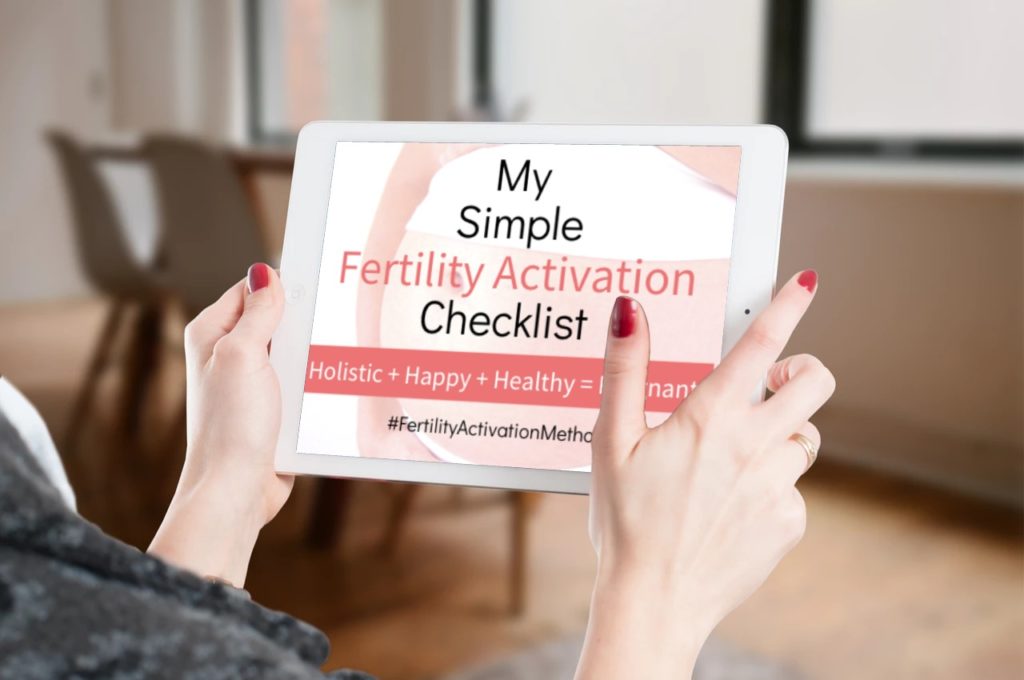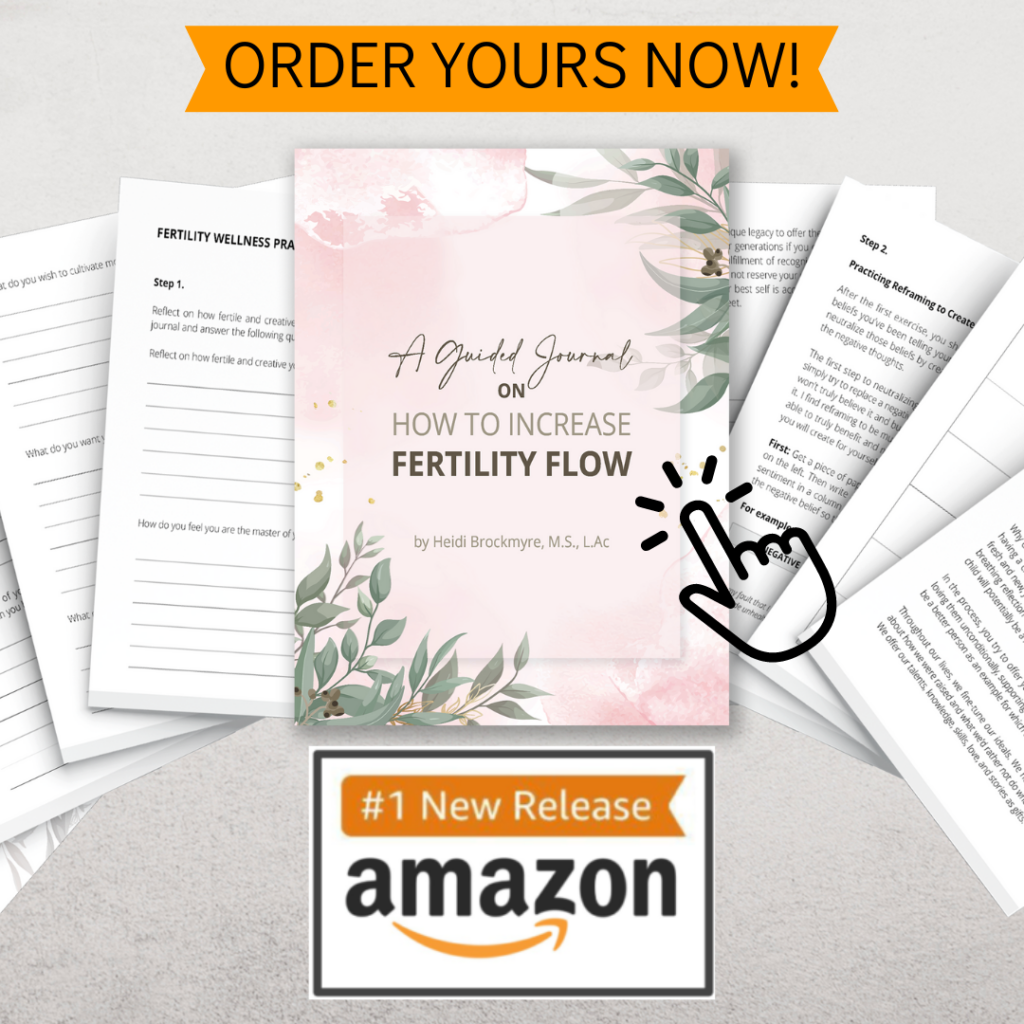
WANNA GRAB MY
FREE & SIMPLE
FERTILITY ACTIVATION CHECKLIST?
Follow these simple steps & get pregnant the easier, healthier & more affordable way!

WANNA GRAB MY FREE & SIMPLE FERTILITY ACTIVATION CHECKLIST?
Follow these simple steps & get pregnant the easier, healthier & more affordable way!
"Can I get pregnant with low AMH?"
I know if you’ve been told by your doctor that you have low AMH, it can be a really devastating thing because usually when your doctor tells you you have low AMH, they also tell you that you’re old, you’re too old, and you don’t have enough eggs left.
Maybe they tell you you need to use an egg donor, which there’s nothing wrong with using an egg donor, it’s a wonderful fertility resource, but you may not be ready to make that leap.
You’re maybe still in a place where you want to continue trying to get pregnant with your own eggs, and your doctor just made you feel like that’s impossible because they said that your AMH is low. I’ve had women come to me even in their early 30s with low AMH, so it’s not just about your age, and it’s not just women that are in their upper 30s or in their 40s that are having issues with low AMH.
Let’s start by talking about what causes low AMH because from a western perspective, usually the fertility doctors, if they run your AMH and they say that it’s low, then they usually think that that means your reserve is pretty low, you’re running low on eggs and that it’s not going to get any better, it can’t be reversed. That’s what they’re making their prognosis on. But the thing is, like I just mentioned, I’ve seen women in their early 30s with low AMH levels, and it wasn’t because they were going into early menopause, it was because they had been on the birth control pill for 10 years, 15 years.
I remember one woman came to me, she was in tears. She had just gone to a fertility specialist. They told her AMH was 0.3. They said, “You better do IVF and do it right now.” It was her first visit, so she was not ready for that. She was just kind of in shock, and she just wasn’t ready. It didn’t feel right to start IVF that very next cycle, but the doctor made it sound like it was her only chance and her eggs were just, poof, disappearing. But it didn’t really quite sit right with her, and that’s why she came to me, thank goodness.
The doctor also told her that she had a 0% chance of conceiving naturally and like a 1% chance of getting pregnant with IVF based on her AMH levels. This woman, again, I think she was like 31 years old. She was quite young and otherwise pretty healthy, but she had been on the birth control pill for a long time. What the birth control pill does is that it decreases circulation to your ovaries and your uterus as well. That’s why you don’t have much of a uterine lining when you’re on birth control pill and maybe even skip periods because the birth control is essentially shutting down your reproductive system, so then when women come off the birth control, it’s still circling through their system, it’s still affecting their hormones, and it’s still affecting their reproductive health.
During this time, the ovaries weren’t awake, so to speak. They were basically sleeping. The ovaries communicate through to the brain through the pituitary gland, and so when you’re shutting down the system, the communication is also shut down. Basically, the ovaries are getting the signal from the brain, “Hey, stop, stop pulling eggs out for ovulation. Shut down production,” essentially, because the truth is, even though your AMH level may be low, a doctor really has no way of knowing how many eggs you have left. We’re born with millions of eggs from the time we start ovulating, getting our period. We go through eggs every single cycle, so by the time we go through menopause, we do have a significant amount less than the eggs that we were born with.
But no doctor really knows how many eggs you have left. The AMH is just representing how many eggs your ovaries are recruiting for ovulation each month. Every month, your ovaries say, “Let’s pull in some eggs, and then we’ll determine out of that bunch of eggs which one is the best one to push through all the way to ovulation.” But if your ovaries are pretty sleepy, then they’re just like, “Oh, we’ll just pull like one or two or three eggs. We’re not going to pull a lot here.” But once you wake up your ovaries, then they can start pulling more. But regardless, even if they’re not pulling a lot more, it’s a matter of pulling a good one and supporting the maturation process of that one egg. It only takes one good egg to get pregnant.
But what happens is a lot of times, once you support your health and get your body really ready for pregnancy, then your AMH levels can improve. For some women, it can be that they took some kind of synthetic hormones or they have some hormonal imbalance. Could be from doing fertility drugs. It can be from birth control. It can be from things that you eat, from pesticides, things in the environment, so on and so forth that can have too much toxic estrogen in your system that can affect your hormonal imbalance. But what else can also affect how alive and well-functioning and vibrant and awake your ovaries are is stress, diet, sleep, circulation to your ovaries, lifestyle, how you are basically supporting your body. How you’re supporting your body is how you’re supporting your ovaries.
Think about it like this. If you’re really tired, if you’re really stressed out, if you’ve been eating a bunch of junk food, you haven’t been getting sleep, maybe you’re also putting some toxins in your body, are you going to be able to go recruit people for like, “Hey, everybody, come on, let’s go. Let’s go. Let’s have a party. Let’s get together and do something.” No, you’re going to be like, “Ugh, I just need to nap and conserve my energy right now, so I can’t get people together to accomplish this goal. I don’t have the bandwidth.” That’s basically what your ovaries are saying. They don’t have the bandwidth to produce, to recruit more eggs, pull them out for ovulation, and because this activity is low, the AMH number is a reflection of how active your ovaries are. It isn’t this number set in stone that says, “You only have this many eggs left, and they’re all turning black.” You can improve your AMH.
I would suggest rather than fixate on the number alone, because a lot of women are like, “Oh, my AMH is a .2. Can I just get my AMH level up?” but instead of that, focus on getting healthier all around because you can get pregnant with low AMH.
By the way, that woman that her doctor said that she had no chance of getting pregnant naturally and 1% with IVF, she got pregnant naturally the very next month after one month of working with me. Naturally. She didn’t even have time to increase her AMH levels. She just got pregnant. The AMH number is not as important as your body being ready and supported and having what it needs to get pregnant.
You really want to get healthier. I’ve definitely had women whose AMH levels have improved following my methods, but obviously, you’re not trying to just improve a number. You’re trying to get pregnant. That’s what you want. Sometimes just focusing on that number alone can get really stressful. Same thing with FSH. I’ve seen women with high FSH, pretty high FSH, like in the 50s getting pregnant naturally as well as with IVF. Yes, you do want to support yourself to get those numbers within closer to normal limits, but really, the main focus is to get your body ready, prepare your body and get it nice and ready for pregnancy and feel better all around.
P.S. Save your seat: Join my FREE Online Masterclass: Learn my 5-Step Fertility Reset Plan
Learn my method to renew your faith in your ability to conceive and take back control of your body and health. (And if you are using fertility treatment, this will work for you too.) Click here to save your seat.


